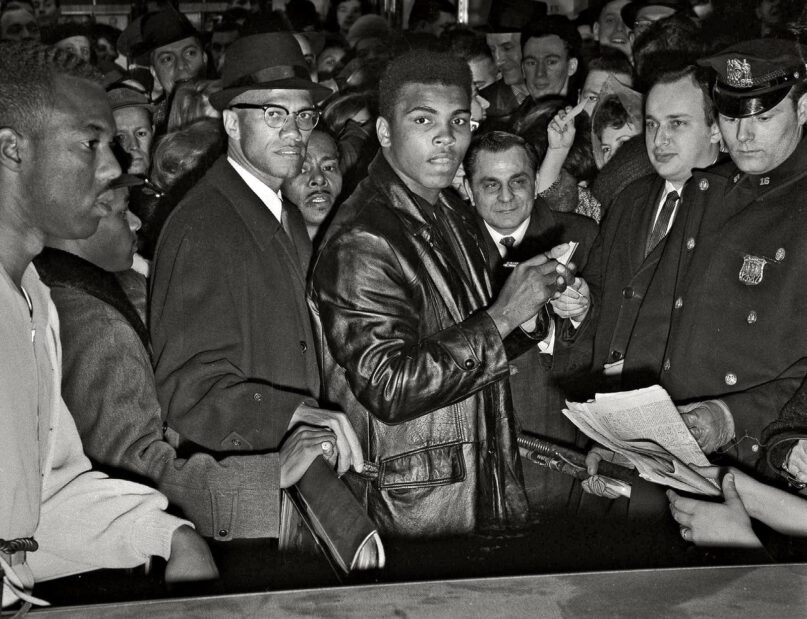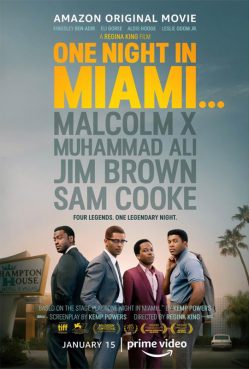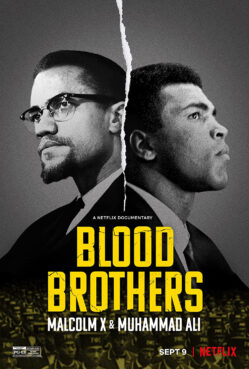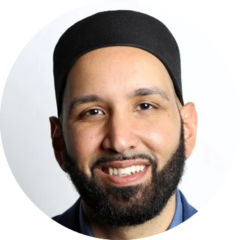(RNS) — “Because all of the people here in Asia, Arabia, and Africa love you madly, you must be forever aware of your responsibility to these billions of dark-skinned people and never do or say anything that will distort the good image they have of you over here,” Al Hajj Malik Al Shabazz Malcolm X wrote to Muhammad Ali in 1964. “You shook up the world. Remember you were the champ in my eyesight before you defeated Liston, so you know I would not advise you wrong.”
Malcolm left his note after the two met by chance in a hotel in Ghana in May of that year, and Ali famously turned his back on Malcolm, his former mentor in the Nation of Islam. The 22- year-old boxer had already heard of Malcolm’s feud with NOI’s leader, Elijah Muhammad, and in Ghana, he was unable to process his emotions upon seeing his famous friend, transformed through his hajj experience.
As Ali describes it, Malcolm wore “traditional Muslim white robes, further signifying his break with Elijah Muhammad. He walked with a cane that looked like a prophet’s stick and he wore a beard. I thought he’d gone too far.”
Over the next half century and more, we have mourned the split between these two legendary 20th-century figures, even as the relationship fascinates us. In January, the film “One Night in Miami,” in which Malcolm and Ali spend an evening with Sam Cooke and Jim Brown, captivated Americans. Last month, an adaptation of the 2018 book “Blood Brothers: Malcolm X and Muhammad Ali” aired on Netflix with the cooperation of some members of the men’s families.
Later in life, Ali would regret his refusal to make peace with Malcolm in Ghana deeply. Weeks before, he had fought and defeated world heavyweight champion Sonny Liston but it was so much easier to fight the enemy you knew in the ring.
For his part, Malcolm knew that many young men were brimming with hatred for him after he left the Nation of Islam, and he forgave them. He was especially sympathetic to Ali, since, for years, Malcolm had taught Ali that the honorable Elijah Muhammad was a divine messenger. Now that messenger was telling Ali that Malcolm was a deluded hypocrite.
He would say, “I might never have become a Muslim if it hadn’t been for Malcolm. If I could go back and do it over again, I would never have turned my back on him.”
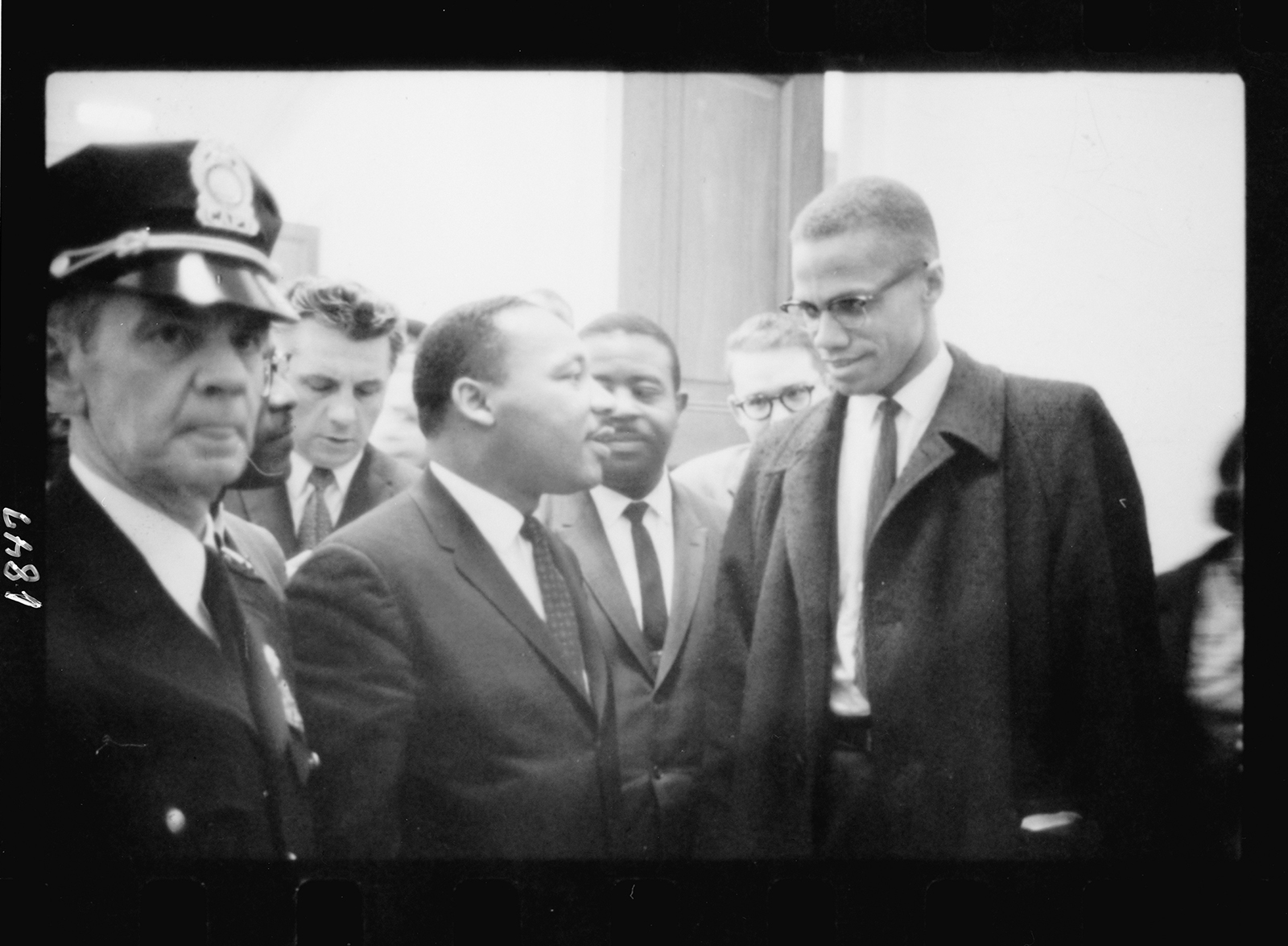
The Rev. Martin Luther King Jr., center left, and Malcolm X speak after King’s news conference at the U.S. Capitol about the Senate debate on the Civil Rights Act of 1964. Photo by Marion S. Trikosko/Library of Congress/Creative Commons
Every semester, in my Islam in the Civil Rights Movement class at Southern Methodist University, I teach about Malcolm X and Martin Luther King Jr. The students derive so much from the photo I show of the two civil rights leaders’ lone meeting, shaking hands on Capitol Hill on March 26, 1964. It lasted only a few minutes, with each man expressing a desire to put aside their differences and start working together.
Malcolm would indeed fly down to Selma, Alabama, to support King, though the latter was in jail at the time. Just weeks later, Malcolm was assassinated. As much as the possibility of the two working together may be a beautiful thought to admirers, it was a terrifying one to the FBI’s J. Edgar Hoover. Perhaps that’s why Hoover sent out a telegram to the agency to “do something about Malcolm X” out of fear he may be the “black messiah.”
Hoover’s FBI certainly played a role in neutralizing Black coalition-building in the 1960s, and in further enflaming tensions between Malcolm and the Nation of Islam. Questions will always remain regarding the FBI’s role in the assassination of both Malcolm and Martin.
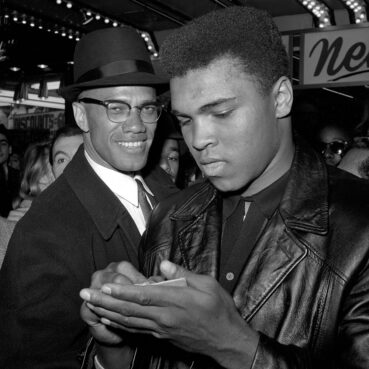
Malcolm X, left, and Muhammad Ali, world heavyweight boxing champion, stand outside the Trans-Lux Newsreel Theater in New York in 1964. (AP Photo)
For all of these activists, the divisions between them were certainly not natural, and we can attribute both their mutual attraction and their alienation to the psychological torture of all they went through, which could only be known by those who experienced it.
Ali’s connection to Malcolm did not end with the latter’s death. Ali’s apartment was set on fire by unknown arsonists the same day that Malcolm was killed. Ali didn’t know what to make of that except to take it as a warning to stay in line. More happily, their families enjoy a closeness today that would make you think they were one.
Some may have a hard time forgiving Ali. But Malcolm would have been the first to push back in defense of his little brother. He would remind us that Ali became everything that he, Malcolm, had prayed he would become and more. Imagine how proud Malcolm would’ve been to see his little brother stand up against America’s war machine and put it all on the line in his refusal to be drafted.
Imagine the tears of joy Malcolm would’ve shed seeing Ali light the Olympic flame at the Atlanta games as a hero who had inspired hundreds of millions of people around the world.
Among Malcolm’s many good qualities was his absolute selflessness. He wanted Ali to be a champion of humanity and the best version of himself to make the world in turn a better version of itself.
So as the books are written and movies produced about the unfortunate rift, the beauty of Malcolm’s influence on Ali is exhibited in the way Ali influenced the world after him.
- “One Night In Miami” on Amazon Prime
- “Blood Brothers” on Netflix
As Muslims, we look back on the lives of the companions of the Prophet Muhammad (peace be upon him) for inspiration. They didn’t all embrace the message of the Prophet at the same time. Some of them persecuted and even killed some of the Prophet’s followers before becoming Muslims themselves.
The Prophet said that God laughs at two men who meet in Paradise with one of them having even killed the other before repenting. But as they reside on thrones facing one another as brothers and sisters, all of their worldly quarrels have passed.
In the case of two shining heroes, Malcolm and Ali, I pray that is the case for them now. What is certain is that both men’s stories would be incomplete without the other. They would be grateful to each other for the mutual love and influence on each other’s legacy.
For that, we are grateful to God and to them for what they gave to us that continues to inspire us to be great.
